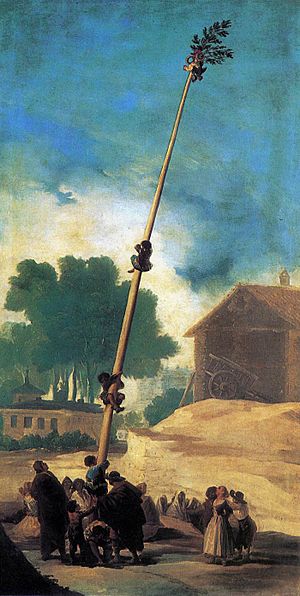La cucaña facts for kids
Quick facts for kids The Greasy Pole |
|
|---|---|
| French: Le Mât de cocagne, Spanish: La cucaña | |
 |
|
| Artist | Francisco de Goya |
| Year | c. 1786–1787 |
| Type | Oil on canvas |
| Dimensions | 169 cm × 88 cm (67 in × 35 in) |
| Location | Private collection, Madrid |
The Greasy Pole (in Spanish: La cucaña, French: Le Mât de cocagne) is a famous painting by the Spanish artist Francisco de Goya. He created it around 1786 or 1787. This artwork shows a fun and popular game where people try to climb a tall, slippery pole.
About the Painting
Goya's painting, The Greasy Pole, is part of a series of artworks called tapestry cartoons. These were special designs that Goya made for tapestries. Tapestries are like large, woven pictures used to decorate walls.
The Greasy Pole Game
The painting shows a lively scene of a game called "the greasy pole" or "cockaigne pole." In this game, a tall pole is covered in grease or oil. People, often boys, try to climb to the very top. It's a challenging and exciting game, and the painting captures all the action.
What You See in the Painting
In the painting, you can see several boys trying to climb the slippery pole. They are fighting and pushing to reach the top. The background of the painting is a bit blurry, but you can still see some farms and a crowd of people watching the game. This shows that the greasy pole was a popular event in Goya's time.
See also
 In Spanish: La cucaña para niños
In Spanish: La cucaña para niños
- List of works by Francisco Goya
- Cockaigne
- Greasy pole
 | Audre Lorde |
 | John Berry Meachum |
 | Ferdinand Lee Barnett |

